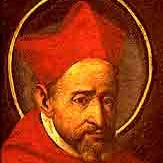Regina Caeli – Queen of Heaven, Rejoice!
The Regina Caeli, Latin for “Queen of Heaven,” is a hymn and prayer ...

St. Roberts Bellarmine was baptized Roberto Francesco Romolo Bellarmino in his hometown of Montepulciano in Tuscany in 1542. In 1560 he entered the Jesuit’s Roman College and joined the Society of Jesus, being ordained priest in 1570. He was sent to the Catholic University Louvain Belgium in 1570 where he quickly gained a reputation for learning and eloquence. St. Robert moved back to Rome in 1576 where he became professor of controversial theology at the newly founded ‘Collegium Romanum’. He was created cardinal in 1599 and from 1602 to 1605 was Archbishop of Capua. His later years were spent in the composition of works of spirituality. The life of St. Robert Bellarmine coincided with the Catholic Reformation, sometimes called the “Counter-Reformation,” which immediately followed the ecumenical Council of Trent. As a result, St. Robert’s work was largely devoted to scholarship and controversial theology. He proved himself a vigorous and successful opponent of the Protestants, whom he sought to win over to the Catholic position by reason and argument. Even the Protestant King James I of England engaged in controversy with him. His chief work was the Disputationes de Controversiis Christianae Fidei adversus hujus temporis Haereticos (3 vols., Ingolstadt, 1586-93), a systematic and clear apologia for the Roman Catholic position. He also took a prominent part in the production of the revised edition of the Vulgate, known as the Sixto-Clementine, in 1592. As regards to the Papacy, he supported Paul V in his struggle against Venice and defended the concept of the temporal authority of the Pope, though saw this power as indirect and limited. The reasonableness and fairness of this great post-Tridentine theologian is demonstrated by his sympathetic interest in Galileo and his scientific views that were harshly rejected as unbiblical by other Roman theologians of the day. St. Robert Bellarmine was canonized in 1930 and declared to be a Doctor of the Church in 1931. His feast day in the Roman calendar is September 17th (formerly 13 May). Biography by Dr. Italy